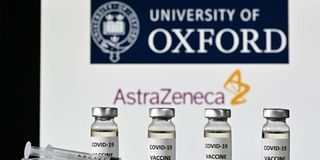Covid-19: UK approves Oxford/AstraZeneca vaccine, sets rollout for Jan 4

An illustration picture shows vials with Covid-19 Vaccine stickers attached and syringes, with the logo of the University of Oxford and its partner British pharmaceutical company AstraZeneca, on November 17, 2020.
The University of Oxford and AstraZeneca have received an approval for their vaccine, AZD1222, in the United Kingdom.
The vaccine is the second to be approved in the UK and third globally after those developed by Pfizer-BioNtech and Moderna.
The news came as the United States (US) reported its first incidence of the new coronavirus variant first identified in the UK.
The new mutation is said to be more contagious and has prompted some countries to restrict travel from the UK.
Globally, more than 81.9 million people have been diagnosed with the virus and 1,787,283 have died, according to data from Johns Hopkins University.
Advantages
The vaccine, by scientists at the University of Oxford in partnership with Swiss-British pharmaceutical AstraZeneca, was designed in the first months of 2020 and tested on the first volunteer in April.
It has since been through large-scale clinical trials involving thousands of people.
Compared to the first two (Pfizer/BioNtech and Moderna), which require storage under sub-zero temperature to remain viable, the AZD1222 vaccine can be stored under normal refrigeration temperatures at 2-8 degrees.
This makes it easy to store, transport and distribute, but it has a lower efficacy than the first two.
The Medicines and Healthcare products Regulatory Authority (MHRA) has approved the vaccine for use in the UK.
The country has ordered 100 million doses of the coronavirus vaccine, enough to vaccinate 50 million people and is expected to begin using it on January 4.
Rigorous trials
Announcing the approval, the Department of Health and Social Care (DHSC) said on Wednesday that the vaccine would be available for those at highest risk of Covid-19.
“Everyone will still receive their second dose within 12 weeks of their first. The second dose completes the course and is important for longer term protection,” said a DHSC spokesperson.
The decision to approve the vaccine followed “rigorous clinical trials and a thorough analysis of the data by experts at the MHRA, which has concluded that the vaccine has met its strict standards of safety, quality and effectiveness”, the DHSC said.
A safe and efficacious vaccine against the severe acute respiratory syndrome coronavirus 2 (SARS-CoV-2) virus, if deployed with high coverage, could contribute to control of the Covid-19 pandemic.
“The regulator’s assessment that this is a safe and effective vaccine is a landmark moment, and an endorsement of the huge effort from a devoted international team of researchers and our dedicated trial participants," said Prof Andrew Pollard, the director of the Oxford Vaccine Group and the chief investigator of the Oxford trial.
"Though this is just the beginning, we will start to get ahead of the pandemic, protect health and economies when the vulnerable are vaccinated everywhere, as many as possible as soon possible."
Approval process
Appraisal of the Oxford vaccine has taken longer than it did for the Pfizer/BioNTech vaccine, which the UK approved faster than any other regulator in the world on December 2. The dossier of testing and trial results for the Oxford vaccine is more complicated.
Pfizer/BioNTech, whose vaccine is based on novel mRNA (messenger-RNA) technology, had positive and straightforward results, with 95 per cent efficacy from an international trial involving 43,000 people.
On the other hand, Oxford/AstraZeneca had 62 per cent efficacy in their largest trial, of 11,636 people, but 90 per cent efficacy in 2,741 people, a small additional sub-group in the UK who were given a half dose of the vaccine, followed by a whole dose four weeks later.
Two weeks ago, an interim analysis confirmed that the Oxford/AstraZeneca vaccine is safe and effective among people who have symptoms of the disease.
Pooling the results, overall efficacy was 70.4 per cent, the data showed. That is above the 50 per cent minimum set by the US Food and Drug Administration (FDA).
Asymptomatic infection
The analysis involved four randomised controlled trials in 23,745 participants in four countries including Brazil, South Africa, and the UK.
It also found that the vaccine might also protect against asymptomatic infection, with protection of about four per cent if administered in two full doses, and 59 per cent if given as a half then a full dose.
Although enrolled late, Kenya is one of the countries that have been carrying out phase 3 trials on the AstraZeneca vaccine.
The researchers have pointed out that none of the volunteers in the trials became seriously ill or were admitted to hospital after taking the vaccine.
In Kenya, where results of the 400 participants are expected sometime in June next year, scientists are investigating whether using a single dose of the vaccine will give the same immunity compared to the protocol, which requires one to be given a half, then a full dose.





